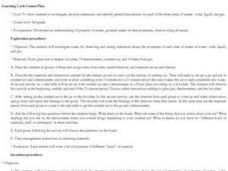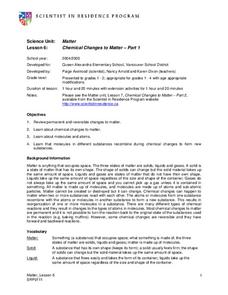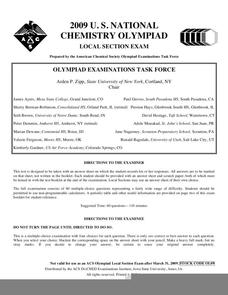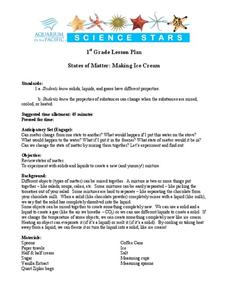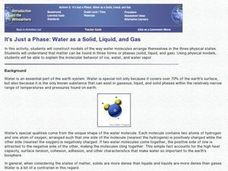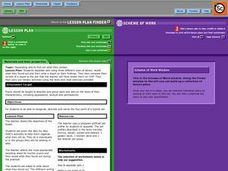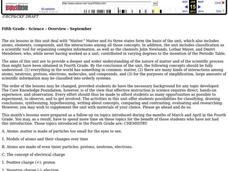Curated OER
Matter, Matter, Everywhere!
Eighth graders make inquiry about the existence of matter. A definition of the word is needed before students can engage in various activities. The application of knowing about matter is done in the working of experiments.
Curated OER
Matter
Students complete a unit of activities to learn about states of matter and how to measure matter. In this matter lesson, students complete 8 lessons to learn about matter, its states, and how to measure matter.
Curated OER
Learning Cycle Lesson Plan
students investigate, develop inferences, and identify general descriptions for each of the three states of matter - solid, liquid, and gas. students investigate water, by observing and stating inferences about, the properties of each...
Steinhardt Apps
Kinetic Molecular Theory
Building off young chemists' knowledge of the states of matter, kinetic molecular theory is the focus of the unit. Eight days of lessons including multiple demonstrations, one lab experiment, directed instruction, and worksheets,...
Concord Consortium
Molecular View of a Solid
Why are solids, well ... solid? Take a peek inside a solid substance with an easy-to-use interactive. Science sleuths examine the motion and position of the atoms that make up a solid before drawing conclusions from their observations.
Curated OER
Matter
Students recognize that some changes to matter are reversible and some are not. In this matter lesson, students experiment a physical and chemical change. Students record experiment results in their science journals. Students act...
Curated OER
Sound: What is Sound and how does it travel?
Young scholars learn that vibration makes different types of sounds. In this sound lesson, students perform experiments to understand vibrations and high and low pitch sounds. Young scholars learn that sound travels differently through...
Curated OER
2009 U. S. National Chemistry Olympiad - Local Section Exam
Here is a copy of a past national challenge exam that you can use in your general chemistry course as a unit or semester review. Sixty multiple-choice questions query learners on properties of matter, stoichiometry, reactions, and...
Curated OER
Making Ice Cream
First graders create ice cream in class. In this matter lesson, 1st graders discover solids, liquids and gases and the properties of each. Students produce a batch of ice cream in class using household items.
Curated OER
It's Just a Phase: Water as Solid, Liquid and Gas
Students construct models of the way water molecules arrange themselves in three physical states - solid, liquid, and gas. They explain the molecular behavior of ice, water, and water vapor.
Curated OER
Solid, Liquid or Gas?
Students explore solid, liquids, and gases. In this science lesson plan, students distinguish similarities and differences of matter and recognize that different states of matter may appear in one substance.
Curated OER
Solids, Liquids, and Gases
Students explore the three main forms of matter: solid, liquid, and gas. They examine concrete examples of each, using their five senses and "experimenting" to find differences in them. They find pictures of each, cut them out and past...
Curated OER
Ice cream in a Bag
Students make ice cream from scratch. They discuss the Food Guide Pyramid and what constitutes healthy and unhealthy food choices. Students experiment states of matter - solids, liquids, and gases. They predict each stage of the ice...
Fuse School
Quiz: Diffusion and Solubility Curves
Quiz time! Part eight in a 14-part series about solids, liquids, and gases provides an opportunity to assess individual's learning. The interactive quiz covers the topics of solubility, solubility curves, and diffusion.
Steve Spangler Science
Halloween Dry Ice Secrets
Want to use dry ice in your classroom this Halloween but you're not sure how? A thorough packet of 13 dry ice activities showcases engaging ways to bring chemistry to life this October.
Curated OER
Science: Identifying Properties of Matter
Students observe a demonstration of the the three forms of matter - air, water, and solids - in plastic bags. After discussing the properties, they transfer them to a Venn diagram. Finally, students identify five items in the classroom...
Curated OER
Science- Unit on Matter- Liquids-
Second graders discover that everything is made of matter. they determine the properties of liquids and that like solids, liquids can be grouped or classified according to properties or qualities. they assess that solids have a definite...
Curated OER
Classification of Matter
In this classification of matter worksheet, students answer 15 questions about solids, liquids and gases, types of mixtures and compounds vs. elements. They also answer 2 questions about measurement and 1 question about a biome.
Curated OER
Materials And Their Properties
Seventh graders investigate the particulate level of solids, liquids, and gases. They examine how the particle method show the interplay between scientific theories and evidence.
Curated OER
Melt the Ice
Learners examine and discuss how water changes from a liquid to a solid to a gas. They explore this concept by having an ice cube race, competing to see which group can change the solid water back into liquid water first.
Curated OER
Matter
Fifth graders investigate the nature of matter and of the scientific processes associated with them in this series of lessons.
Curated OER
Liquids in Bottles
Students investigate different liquids to develop their concept of a liquid. They work at a center to tip, swirl, shake, roll, and otherwise investigate seven liquids in small, clear plastic bottles: plain water, corn syrup, liquid...
Curated OER
What's the Matter?
Students investigate matter. In this matter lesson, students identify types of matter and characteristics of each type. Students discuss matter and create matter posters to show understanding.
Curated OER
Phases of Matter
Students describe the motion of solids, liquids and gases. In this chemistry lesson, students describe how temperature affect motion of the particles. They determine the physical properties of each phase.




